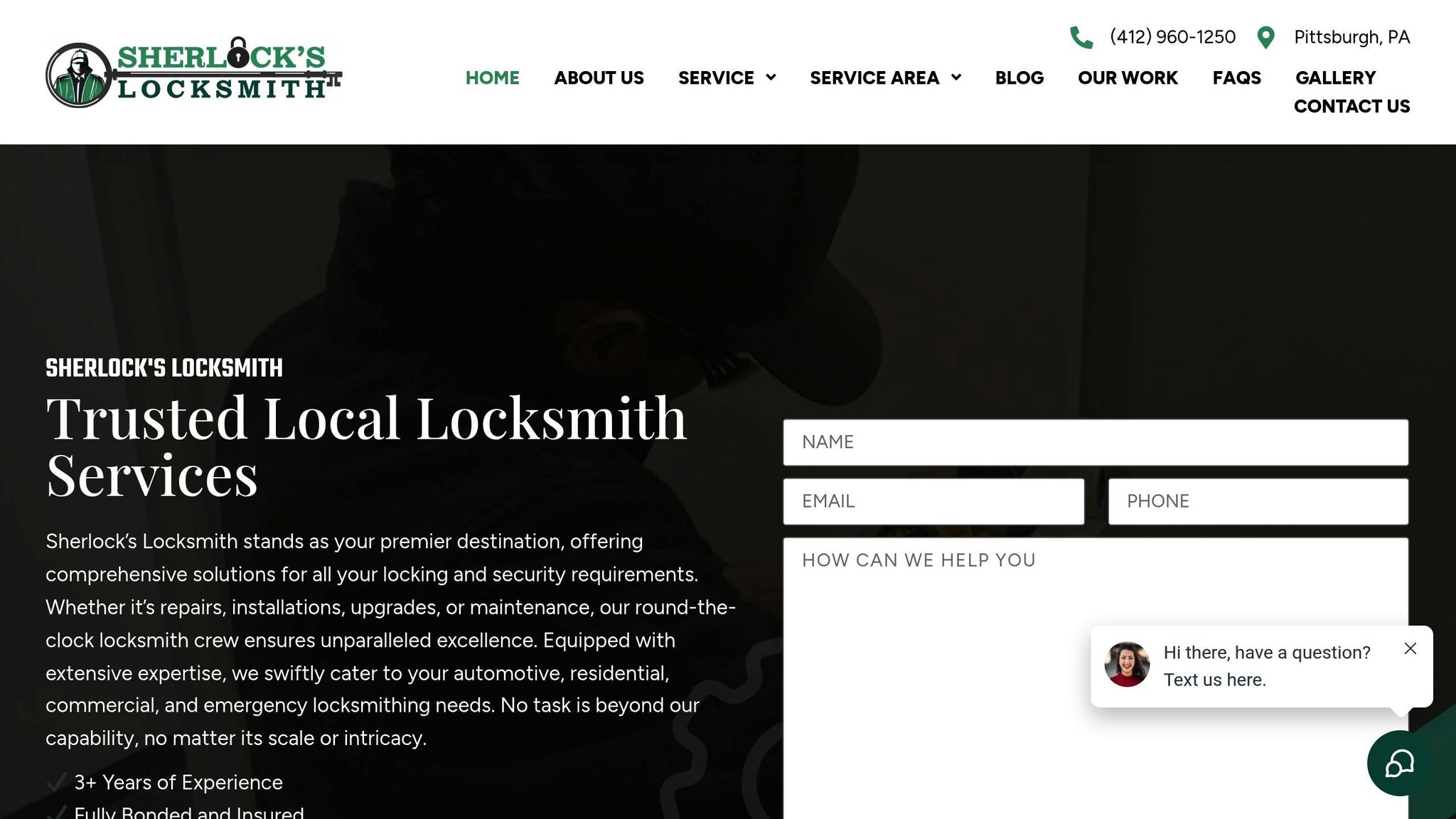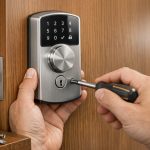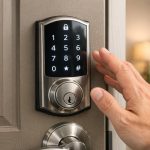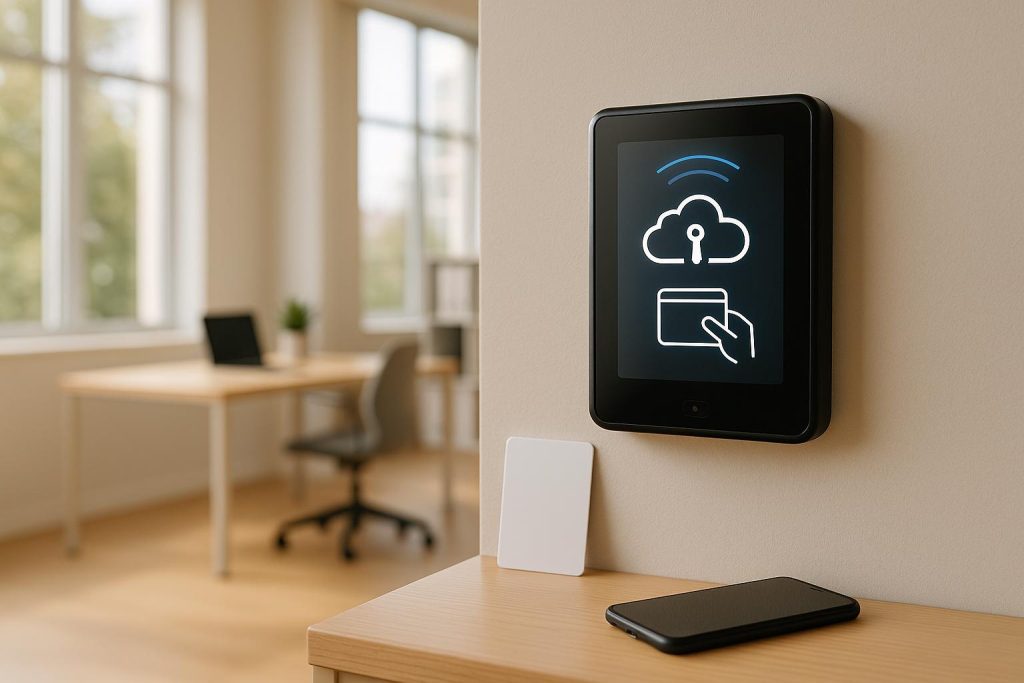Cloud-based access control systems are becoming a go-to choice for managing property security. They allow you to control access remotely, integrate with other security tools, and eliminate the hassle of manual updates. Key features to look for include mobile access, real-time alerts, scalability, and strong data security. These systems are cost-effective, easy to scale, and reduce the need for physical server maintenance. Professional installation and support ensure your system functions efficiently while keeping your property secure.
Key Takeaways:
- Remote Management: Control access from anywhere via apps or web dashboards.
- Real-Time Alerts: Get instant notifications for access events or security issues.
- Scalability: Easily expand to include more users, locations, or devices.
- Integration: Connect with cameras, alarms, and other systems for a unified setup.
- Data Security: Look for encryption and compliance with industry standards.
For properties in Pittsburgh, Sherlock’s Locksmith offers expert installation and 24/7 support to ensure your system runs smoothly and securely.
Cloud vs. On-Premises Access Control: Choosing the Right Solution
Key Features to Look for in a Cloud-Based Access Control System
When you’re assessing cloud-based access control systems, certain features can make all the difference between a basic setup and a system that truly safeguards your property. These features determine how well you can manage security and respond to potential risks.
Remote Access and Mobile Management
One of the biggest advantages of cloud-based systems is remote access. With mobile apps and web dashboards, you can grant or revoke access permissions instantly – whether you’re at home, in the office, or halfway across the country.
These systems are designed to work seamlessly across devices. Need to add a new user, adjust access schedules, or lock a door? A few taps on your phone or clicks on your computer can get it done. This is particularly handy for business owners who need to provide temporary access to contractors, delivery drivers, or new hires outside of standard hours.
High-quality systems also let you set custom access schedules, apply time-based restrictions, and manage multiple locations from one centralized dashboard. For businesses in areas like Pittsburgh with several facilities, this streamlined approach can save hours of administrative effort while simplifying security management.
Real-Time Monitoring and Alerts
A standout feature of modern systems is real-time monitoring. Instant alerts – delivered via phone or email – keep you informed about entries, failed attempts, or system malfunctions. Detailed activity logs track every single access event.
But it doesn’t stop there. Advanced systems can flag unusual access patterns, detect repeated failed entry attempts, and alert you if a door remains open longer than it should. These real-time notifications enable you to address potential security breaches immediately, rather than discovering them hours or even days later.
For businesses that need to follow strict security regulations or investigate incidents, this level of insight is invaluable. It not only helps with compliance but also ensures your system can adapt as your security needs evolve.
Scalability and Flexibility
Scalability is a must-have for any cloud-based access control system. These systems are designed to grow with your business, whether you’re onboarding more employees, adding new locations, or increasing the number of access points.
Unlike traditional systems that often require costly hardware upgrades, cloud-based solutions let you expand through simple software updates. For example, you can start with basic door control and later add features like elevator access or parking gate management.
Many cloud systems operate on a subscription-based pricing model, which means you pay for what you use. This eliminates the need for hefty upfront investments in hardware that could become outdated, making it easier to scale without breaking the bank.
Integration with Existing Security Infrastructure
Your cloud-based access control system should complement your current security setup, not force you to start from scratch. Systems with open APIs and standard protocols can integrate with video surveillance cameras, alarm systems, and even building automation tools.
This integration creates a unified security ecosystem. For instance, an access event could trigger a camera to start recording or send an alert to your phone.
If your business has already invested in security infrastructure, choosing a system that works with your existing tools can save you both time and money. Professional security providers can help evaluate your setup and recommend solutions that enhance, rather than replace, your current investments.
Data Security and Compliance
The security of your access control system itself is critical. Look for systems that encrypt data both in transit and at rest, using bank-grade encryption standards. Additionally, ensure the provider holds recognized security certifications.
Compliance is another key factor, especially for businesses in regulated industries. For example, healthcare facilities may require HIPAA-compliant systems, while financial institutions might need to meet SOX requirements. Top cloud providers often maintain multiple certifications and can supply the necessary documentation for audits.
Other essential features include data backup and redundancy. These ensure your system remains operational even if a primary server fails. With multiple data centers and automatic failover capabilities, you can trust that your security system will stay reliable. Plus, automatic updates keep your system protected against new threats as they emerge.
Factors to Consider When Choosing a System
Choosing the right cloud-based access control system means looking closely at the specific needs of your property. The best system for you will depend on your security requirements, daily operations, and budget.
Understanding Your Property’s Security Needs
Start by identifying what you need to protect. Whether it’s a retail store, a multi-story office, or a residential property, each has unique access control demands. Think about factors like the number of entry points, shift schedules, and potential security risks. For example, do you need to accommodate employees working in rotating shifts, manage temporary access for contractors, or handle frequent staff changes? In such cases, a system with strong user management features can be a game-changer.
Your property’s location matters too. If you’re in an area with higher crime rates, you might want advanced monitoring tools and faster alert systems. Managing multiple properties, whether in Pittsburgh or elsewhere, can benefit from a centralized system. Such systems make it easier to handle updates remotely and scale up as your operations grow.
Ease of Use and User Experience
Once you’ve assessed your security needs, it’s time to focus on how easy the system is to use. A security system is only as effective as the people operating it. If it’s confusing or overly complex, users might unintentionally weaken your security by making mistakes.
Pay close attention to the mobile app that comes with a cloud-based system. Can you quickly add new users or adjust settings without hunting through endless menus? The interface should feel intuitive, saving you time and frustration.
Training is another key consideration. Some systems require lengthy training sessions, while others are designed to be user-friendly right out of the box. Think about how much time you’re willing to spend on training versus having a system that’s simple enough for users to pick up quickly.
Don’t forget the administrative dashboard. Since you’ll likely spend a lot of time managing users, reviewing access logs, and tweaking settings, the dashboard should be straightforward and easy to navigate. A cluttered or overly complicated interface can turn routine tasks into a hassle.
Cost and Long-Term Value
Cloud-based systems come with ongoing subscription fees in addition to the initial hardware costs. To get a clear picture of the total cost, factor in hardware, installation, recurring fees, and any extra charges for optional features like detailed reporting or integrations with other systems.
Installation costs can vary based on your property’s existing setup. Professional installation is usually worth it, as it ensures everything is configured correctly and minimizes future maintenance headaches.
These systems can also save money over time. For instance, they reduce the need for on-site security staff, eliminate rekeying expenses when employees leave, and provide detailed audit logs that might help lower insurance premiums. Businesses can save time by granting temporary access remotely, cutting down on administrative overhead.
Don’t overlook ongoing expenses like hardware replacements, software updates, and technical support. Many providers include updates and basic support in their subscription plans, but some charge extra. Knowing these costs upfront can help you budget better and avoid surprises down the road. By weighing these factors, you can choose a system that meets your current needs and continues to deliver value in the future.
sbb-itb-643e28e
The Role of Professional Installation and Support
Setting up a cloud-based access control system isn’t as simple as buying the hardware and downloading an app. To ensure the system operates effectively and securely, professional installation and ongoing support are key. Without them, you risk security gaps and operational headaches.
Why Professional Installation Matters
Getting the installation right is crucial for both security and functionality. Mistakes during setup can introduce vulnerabilities, leaving your property exposed to unauthorized access. Certified installers bring more to the table than just technical know-how – they start with a detailed site assessment to confirm that your infrastructure can handle the new system. They also ensure seamless integration with your existing security measures. By carefully positioning devices according to manufacturer guidelines, they reduce setup downtime and optimize system performance [7,8].
Post-installation testing is another critical step. Professionals rigorously test the system under real-world conditions, using both valid and invalid credentials to ensure everything works as intended. This attention to detail not only addresses potential issues upfront but also helps maintain the system’s warranty by ensuring proper calibration and secure installation [7,8]. A solid installation lays the groundwork for smooth ongoing maintenance and reliable performance.
Ongoing Maintenance and Support Services
Once installed, cloud-based systems need regular upkeep to stay at their best. Professional support includes routine system checks, software updates, and quick troubleshooting when issues arise. Regular maintenance helps catch small problems before they grow into major disruptions, while remote monitoring and firmware updates ensure the system stays compatible with new devices and software. Additionally, technicians provide training for your team, so they can confidently manage access credentials and monitor system activity.
Sherlock’s Locksmith: Pittsburgh’s Trusted Partner for Security

For properties in Pittsburgh, Sherlock’s Locksmith offers expert installation and support for cloud-based access control systems. Their certified technicians handle everything from initial setup to ongoing maintenance, using advanced tools and techniques to ensure a seamless experience. They also provide 24/7 mobile locksmith services, so you’re covered in emergencies or when system adjustments are needed. Whether it’s a residential or commercial property, Sherlock’s Locksmith can integrate new access control systems with your existing security setup, tailoring solutions to meet your specific needs.
Making the Right Choice for Your Security Needs
When it comes to choosing the right cloud-based access control system, understanding your specific requirements is key. These systems have become reliable options for both residential and commercial properties, offering modern solutions that go far beyond traditional locks and keys.
Key Takeaways for Homeowners and Businesses
Remote management capabilities should be a top priority. The ability to grant or revoke access remotely, receive real-time alerts, and monitor entry activity provides a level of control that older systems simply can’t achieve. This is especially helpful for businesses with multiple locations or households needing to manage temporary access for guests or service providers.
Scalability is another important factor. With cloud-based systems, you can add access points without the hassle of extensive wiring or major renovations. Just keep in mind that costs will rise as you add more doors or users.
Professional installation and ongoing support are essential – not optional. A professional setup ensures everything works smoothly, reduces downtime, and protects your warranty. Plus, ongoing support keeps your system running efficiently over time.
Data security and compliance are critical for properties that deal with sensitive information or must meet regulatory standards. Look for systems offering encrypted data transmission, secure cloud storage, and compliance with relevant security protocols.
By focusing on these aspects, you can evaluate your current setup and plan for upgrades that meet your needs.
Next Steps to Secure Your Property
Start by thoroughly assessing your current security setup to pinpoint vulnerabilities. Take note of all entry points, such as doors, gates, and storage areas, that require controlled access.
Create a list of users and their access needs. This includes employees, contractors, delivery drivers, cleaning crews, and family members. Understanding who needs access and when will help you determine which features are essential for your system.
Set a budget that covers all aspects of the system. Include hardware, installation, subscriptions, potential expansions, and maintenance. Many cloud-based systems use tiered pricing, so costs will adjust as you scale up.
If you’re in the Pittsburgh area, Sherlock’s Locksmith offers tailored consultations to help you find the right cloud-based access control solution. Their certified technicians can assess your current setup, explain integration options, and provide detailed cost estimates specific to your property. With 24/7 mobile service, they’re available to assist with system upgrades or emergency access needs whenever they arise.
Matching the system’s features to your security needs and securing professional installation and support ensures your property stays protected for years to come. A well-chosen system is an investment in safety and peace of mind.
FAQs
What are the main advantages of using a cloud-based access control system instead of a traditional one?
Cloud-based access control systems bring a range of advantages that make them an appealing option for both homes and businesses. One standout feature is remote access management, which lets you monitor and control access no matter where you are. This not only adds convenience but also allows for swift action when security concerns arise.
These systems are also incredibly simple to scale and maintain. Since the provider takes care of updates and maintenance, you can skip the operational headaches that often come with traditional setups.
On top of that, they offer advanced security features like real-time alerts and the ability to integrate effortlessly with other security tools. This kind of flexibility ensures the system can keep up with changing security needs while giving you centralized control to enhance overall safety. If you’re seeking a modern, dependable solution, cloud-based systems are definitely worth considering.
How can cloud-based access control systems improve the security of your existing setup?
Cloud-based access control systems bring a modern edge to your security setup by providing centralized management, real-time monitoring, and automatic updates. These features work together to minimize vulnerabilities and enhance response times, ensuring your infrastructure stays protected.
What’s more, these systems easily connect with other security tools, like video surveillance, creating a unified network that’s both effective and efficient. This seamless integration boosts threat detection and response capabilities, while also simplifying day-to-day operations by letting you oversee everything from a single platform. The outcome? A stronger, more reliable, and streamlined way to safeguard your property.
What factors should businesses evaluate when considering the scalability and costs of a cloud-based access control system?
When selecting a cloud-based access control system, it’s important for businesses to look at scalability and cost efficiency. A scalable system allows you to expand seamlessly – whether that means adding more doors, locations, or users – without the hassle of significant hardware upgrades. This kind of flexibility is especially useful for companies with plans to grow.
On the cost side, take into account subscription fees, which typically fall between $3.50 and $15+ per door each month. Additionally, cloud systems often save money by cutting down on hardware needs, like physical servers. By prioritizing these aspects, businesses can keep expenses under control while ensuring their security system evolves alongside their operations.









